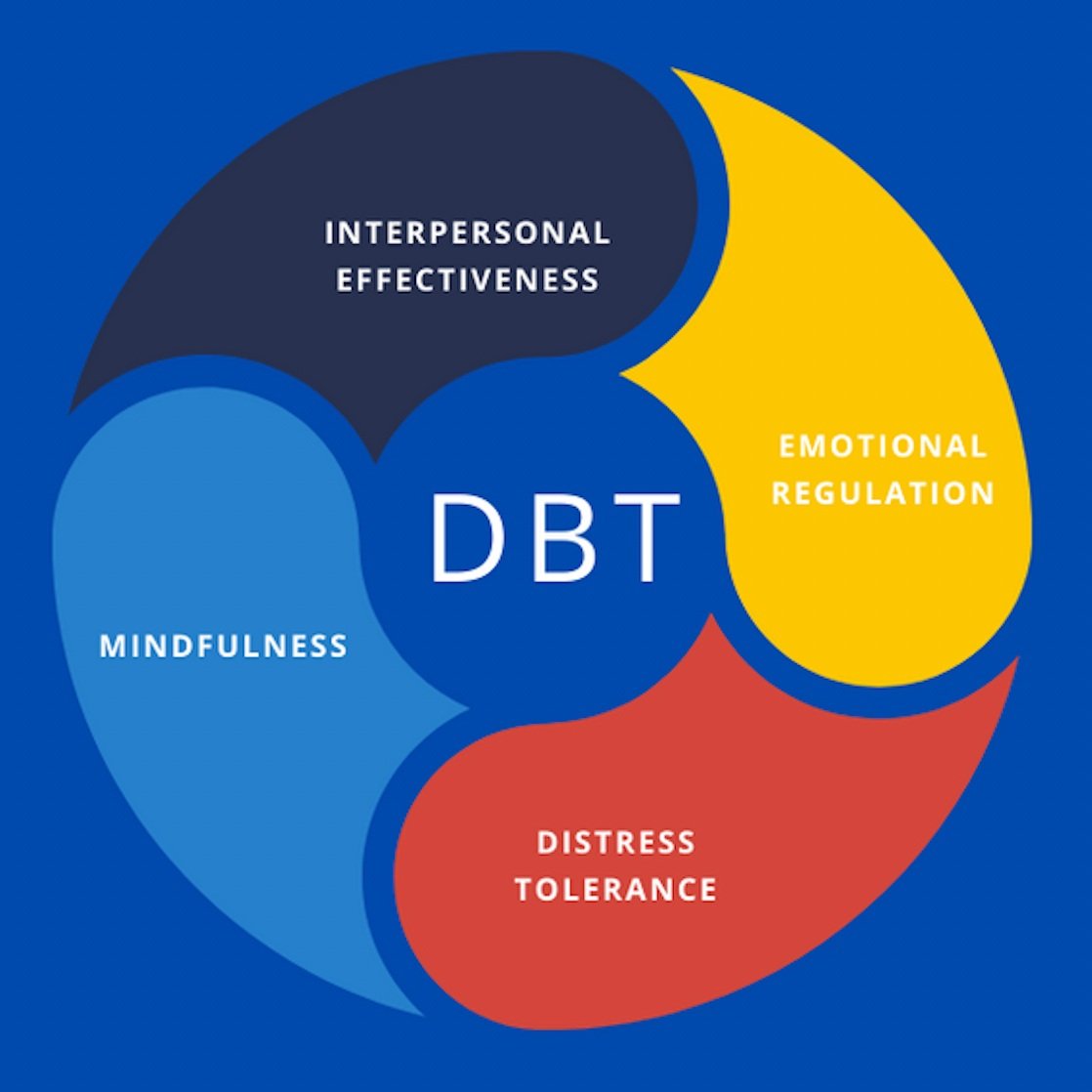DBT London: Where Hope and Healing Intersect for Lasting Change
DBT London: Where Hope and Healing Intersect for Lasting Change
Blog Article
Encouraging Individuals Via Reliable Dialectical Practices Therapy (DBT) Providers: Building Stronger Mental Health And Wellness Foundations
In the realm of psychological health and wellness and wellness, the significance of empowering people with effective Dialectical Practices Treatment (DBT) services can not be overemphasized. By focusing on the core principles of DBT, such as improving psychological policy abilities, boosting social effectiveness, building distress resistance techniques, and cultivating mindfulness methods, individuals can embark on a trip in the direction of building more powerful psychological wellness foundations.
Comprehending the Core Concepts of DBT


One core concept of DBT is validation. Specialists using DBT recognize the client's sensations and behaviors as valid responses to their atmosphere. This recognition assists construct a strong healing partnership and encourages people to function towards change. Another essential element is dialectics, which shows people to watch scenarios from multiple viewpoints and discover the synthesis in between contradictory thoughts or emotions.
Moreover, the principle of dialectical abstinence is central to DBT. This principle urges individuals to abstain from suicidal behaviors while additionally approving themselves. By understanding and integrating these core concepts, specialists can properly apply DBT techniques and assistance individuals in their journey towards psychological law and mental well-being.
Enhancing Emotional Policy Skills
Establishing efficiency in handling emotions is an essential facet of cultivating mental health and social performance - DBT London. Enhancing psychological guideline abilities is a core element of Dialectical Practices Treatment (DBT) that outfits people with the tools to browse extreme feelings in a healthy and constructive manner. Through DBT, people find out to determine, recognize, and regulate their feelings, resulting in boosted psychological wellness results
DBT highlights the significance of mindfulness, which involves existing in the minute without judgment. This method allows people to observe their feelings without ending up being overwhelmed by them, enhancing their capacity to react properly instead of respond impulsively. By cultivating mindfulness, people can create a better sense of self-awareness and emotional control.
Moreover, DBT shows practical abilities such as distress tolerance and feeling law methods to help people take care of tough feelings. By finding out these skills, individuals can lower spontaneous habits, enhance decision-making, and enhance their relationships with others. Ultimately, boosting psychological guideline abilities through DBT equips people to lead more meeting and well balanced lives.

Improving Interpersonal Effectiveness
Having developed a solid structure in psychological guideline abilities within the framework of Dialectical Behavior Therapy (DBT), the emphasis now moves in the direction of enhancing interpersonal performance. Improving interpersonal efficiency is an essential part of DBT as it equips people with the needed abilities to navigate social interactions, connect efficiently, established limits, and construct healthier connections.
In DBT, social effectiveness abilities are shown with modules that focus on locations such as assertiveness, reliable communication, and interpersonal analytic. By learning these skills, people can boost their ability to reveal their wishes and requirements, keep self-respect, and develop more powerful connections with others.
Exercising mindfulness is an essential part of boosting interpersonal performance within the DBT structure. Mindfulness allows people to be existing in their communications, pay attention actively, and respond attentively instead of respond impulsively. By incorporating mindfulness into their everyday lives, people can grow better self-awareness and emotional law, which are necessary for successful interpersonal interactions.
Structure Distress Tolerance Methods
Discovering effective approaches for handling psychological distress is essential for people looking for to improve their coping skills and strength. Structure distress tolerance techniques is a vital facet of Dialectical Practices Treatment (DBT) that find out here equips people to browse tough feelings without coming to be overloaded.
In addition, mindfulness techniques play a substantial duty in building distress resistance. Mindfulness urges people to stay present in the moment without judgment, permitting them to observe their ideas and emotions without reacting impulsively. This awareness enables people to endure distress extra successfully and develop a greater feeling of control over their feedbacks.
Along with these methods, creating a click here to find out more tailored distress resistance plan with the assistance of a skilled therapist can provide people with a customized strategy to taking care of psychological distress - DBT London. By incorporating these methods into life, people can strengthen their psychological health and wellness foundations and boost their general well-being

Cultivating Mindfulness Practices
To deepen their distress tolerance strategies better, individuals can concentrate on cultivating mindfulness techniques as a corresponding technique within the framework of Dialectical Practices Treatment (DBT) Mindfulness, an essential element of DBT, entails taking note of the here and now minute without judgment. By cultivating mindfulness, people can boost their understanding of thoughts, feelings, and physical sensations, promoting a much deeper understanding of themselves and their experiences.
Mindfulness techniques in DBT consist of strategies such as conscious breathing, body scans, and observing thoughts without attachment. These practices encourage individuals to establish a non-reactive position towards their inner experiences, permitting them to react to tough scenarios with better quality and calmness. By including mindfulness into everyday routines, people can find out to manage their feelings better, reduce impulsive behaviors, and grow a feeling of internal tranquility.
Via cultivating mindfulness methods, people going through DBT can construct a strong structure for taking care of stress and anxiety, boosting connections, and enhancing total health. By incorporating mindfulness into their restorative trip, people can create important skills that empower them to navigate life's obstacles with resilience and self-awareness.
Verdict
In final thought, effective Dialectical Behaviour Treatment (DBT) solutions play a vital function in encouraging people to construct more powerful psychological health foundations. By comprehending the core concepts of DBT, enhancing emotional law skills, boosting social effectiveness, developing distress tolerance methods, and cultivating mindfulness techniques, individuals are outfitted with the needed tools to browse their emotions, relationships, and challenges in he said a much more adaptive and resistant manner. DBT solutions provide a detailed approach to advertising psychological wellness and equipping people to lead fulfilling lives.
By focusing on the core concepts of DBT, such as enhancing emotional guideline abilities, improving social performance, building distress tolerance strategies, and cultivating mindfulness methods, people can begin on a trip in the direction of building more powerful psychological health foundations. Enhancing emotional law skills is a core part of Dialectical Behaviour Therapy (DBT) that furnishes people with the devices to navigate intense emotions in a useful and healthy way.In addition, DBT teaches sensible skills such as distress tolerance and emotion law strategies to help people manage difficult emotions.To strengthen their distress tolerance methods additionally, people can focus on cultivating mindfulness practices as a complementary method within the framework of Dialectical Behavior Therapy (DBT) By comprehending the core principles of DBT, improving emotional policy abilities, boosting social effectiveness, developing distress resistance techniques, and cultivating mindfulness practices, people are outfitted with the essential devices to browse their emotions, connections, and challenges in a more adaptive and resistant fashion.
Report this page